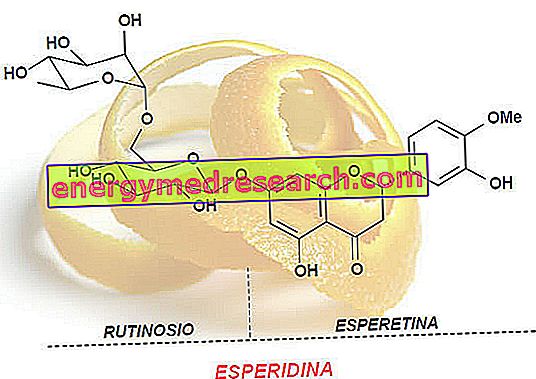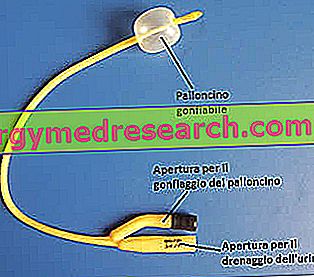Generality
Esperidin is one of the characteristic flavonoids of citrus fruits, where it is concentrated mainly in the peel and in the albedo (the whitish inner part of the peel).
Present to a lesser extent also in green leafy vegetables, Esperidin is made up of a sugary part, the rutinosio disaccharide, linked to the flavone esperitin.

Hesperidin is used as such in the pharmaceutical field; we find it for example in DAFLON ®, indicated as an adjuvant therapy in the treatment of varicose veins, of phlebitic complications of hemorrhoids and of those related to states of capillary fragility.
In fact, Esperidin is widely known for its capillarotropic effects: it reduces the permeability and fragility of capillary walls, while it increases its resistance; in this sense, it shares the action of other vegetable substances, such as diosmin, escin, rutin, horse chestnut extracts, red vine, sweet clover, centella asiatica and blueberries.
At the same time, Esperidin has remarkable antioxidant and anti-inflammatory properties, while in preliminary studies on murine models it has demonstrated hypotensive, cholesterol-lowering and, in large doses, osteotrophic properties (see the article "Hesperidin" for the reference bibliography).

Indications
Why is Esperidin used? What is it for?
Experidin, as well as other flavonoids, is mainly attributed to antioxidant activity.
From the different evidences, in fact, the espiridina would seem to exert a marked antioxidant activity, acting as a direct scavanger towards the free radicals of oxygen and nitrogen, and inducing the synthesis of new antioxidants.
According to several authors, Esperidin could also play an important role in the management of inflammatory, allergic and dyslipidemic states.
Property and Effectiveness
What benefit has Esperidin shown during the studies?
The number of studies related to the clinical efficacy of experidin has grown exponentially in recent years.
Although most of these studies are experimental in nature, the results appear to be quite appealing and worthy of further study.
Hesperidin and metabolic disorders
Beyond the classic antioxidant activity, recent work, both experimental and clinical, would have shown how regular consumption of hesperidin is effective, in just 4 weeks, in determining a clear improvement in cholesterol, with an increase in HDL cholesterol concentrations to the detriment of LDL atherogenic fraction.
This activity, together with the vasoprotective function, could be useful in the prevention of endothelial dysfunction and contextually in the reduction of the cardiovascular risk
Hesperidin and vascular function
The antioxidant activity on the one hand and the anti-inflammatory action on the other would make experidin an excellent ally for vascular health.
To support the vasoprotective benefits of experidin there would also be numerous evidences, both experimental and clinical, according to which the use of this antioxidant could significantly improve the symptoms of hemorrhoids or vascular dysfunction.
Hesperidin and cancer
Although still in a very embryonic stage, some evidence would bury the antitumor activity of experidin.
More precisely, Esperidin would seem to exert an antimutagenic and immunomodulatory action, particularly valuable during esophageal carcinoma, colorectal cancer and melanoma.
Further developments are expected in this regard.
Doses and method of use
How to use Esperidin
Esperidin is present in various supplements, both as a single supplement and as a blend of antioxidants.
The most used dosage in studies is 500 mg daily.
In the management of venous insufficiency and haemorrhoidal pathology, experidin is often associated with diosmin, in a product with a complete formulation and marked antioxidant and vasoprotective activity.
Side effects
The use of hesperidin is generally well tolerated and has no clinically significant side effects.
To date, the most frequently observed adverse reactions are those of a gastro-enteric nature, with the appearance of nausea and abdominal cramps.
Contraindications
When should not espiridine be used?
The use of hesperidin is contraindicated in case of hypersensitivity to the active ingredient.
Pharmacological Interactions
Which drugs or foods can modify the effect of experidin?
The pharmacokinetic characteristics of experidin and other flavonoids are not yet fully known.
In particular, according to some evidence the use of hesperidin would seem to improve the absorption and activity of vitamin C, while other authors would instead describe a contrary action.
Precautions for use
What do you need to know before taking Esperidin?
The use of hesperidin supplements during pregnancy and subsequent breastfeeding should be supervised by your doctor.



